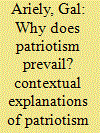| Srl | Item |
| 1 |
ID:
162950


|
|
|
|
|
| Summary/Abstract |
Recent efforts to reduce residential energy consumption have renewed interest in investigating salient drivers of household energy use. This article contributes to the ongoing literature by developing a model for examining geographic effects on energy use. Using a new, rich, micro-level survey that compiles information about dwelling attributes, occupant characteristics, and behaviors, we suggest a combined bottom-up and top-down statistical approach based on a multilevel regression model (MRM) and an innovative variable selection approach via the Adaptive Elastic Net Regularization technique (AdaEnetR). This approach enables us to extract geographic effects from the total variation in residential energy consumption and simultaneously explain the remaining variation with relevant explanatory variables and their interactions. The current model addresses several interrelated issues posed by the use of econometric methods to examine residential energy demand, including the risk of aggregation/disaggregation bias. Our empirical findings demonstrate the MRM's ability to effectively quantify approximately 0.67% of the geographic effects (aggregate level) and approximately 0.31% of the household and dwelling effects (individual level). Further, the findings show that household attributes are important factors that influence residential energy consumption patterns.
|
|
|
|
|
|
|
|
|
|
|
|
|
|
|
|
| 2 |
ID:
153231


|
|
|
|
|
| Summary/Abstract |
Addressing the normative and empirical debate regarding the nature of patriotism, this paper examines the social contexts in which patriotism – defined here as an expression of national pride – thrives. Combining diverse theoretical explanations, it investigates whether expressions of patriotism are related to globalization, state function, social fractionalization and conflict. A multilevel regression analysis of data from 93 countries led to three principal findings. First, citizens of more developed and globalized countries are less likely to be proud of their country. Second, citizens are more likely to be patriotic in countries characterized by higher levels of income inequality and religiously homogeneity. Third, citizens of countries exposed to direct conflict – that is, suffering terror and causalities from external conflict – tend to exhibit higher levels of national pride. Patriotism frequently being identified as a mandatory political commodity, these results suggest that, overall, patriotism forms part of a less attractive matrix than its advocates tend to assume.
|
|
|
|
|
|
|
|
|
|
|
|
|
|
|
|